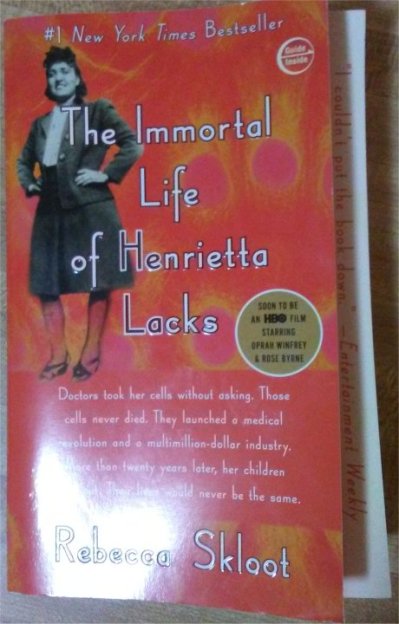 The Immortal Life of Henrietta Lacks floored me. Everything I thought I’d known about the medical industry was upended in these pages. I still find it hard to believe that the concept of informed consent it not just something new in my lifetime, but specifically in my adult lifetime. I cannot fathom how this is possible.
The Immortal Life of Henrietta Lacks floored me. Everything I thought I’d known about the medical industry was upended in these pages. I still find it hard to believe that the concept of informed consent it not just something new in my lifetime, but specifically in my adult lifetime. I cannot fathom how this is possible.
I’m not sure what is more upsetting, the fact that Henrietta’s cells were taken and used without her knowledge or consent, or the blatant disregard for Henrietta and her family the medical community has had since had since they harvested her cells.
Skloot’s research into Henrietta’s background, family and the medical research that has been done using HeLa cells is extensive. Thankfully her writing never gets too technical. It’s clear that she had the Lacks family, none of whom had any understanding of the research done on her cells, in mind when she wrote the book. Skloot makes it clear that while she was determined to tell Henrietta’s story, she wanted to make sure that unlike the multitude of doctors who used Henrietta with little to know care for her as a person, she had the family’s consent and blessing. She wanted to tell Henrietta’s story in a way that would make her children proud and still ensure the world learned about the woman who unknowingly changed the face of modern medicine.
I appreciate the focus Skloot gives to the ethical issues concerning not only Henrietta’s unknowing contribution to science, but also the modern debate about how tissue samples should be handled. While courts have yet to rule on a great many issues relating to these murky waters, they are issues that as a society we should be thinking about. One of the most important aspects of this book is the way Skloot explains just how little control people have over their tissue. While patients may have to sign consent forms in hospitals or doctor’s offices which tell them their tissue may be used for future medical endeavors, I had no idea that any tissue sent off for biopsies or sent in for paternity/DNA/geneology testing could also be saved and utilized in anyway the collectors deem appropriate. Considering how easy it is for modern science to identify people based on DNA samples, it’s kind of scary how easily patient confidentiality can be completely breached with these stored samples.
Skloot brings up some really important questions in this book. Should patients be informed about what will happen to any tissue they have removed from their bodies any time it is removed? Should companies have to compensate donors for their samples? Should companies be able to make millions off of people’s biological donations? Should companies be able to patent gene research information for things like breast cancer, thereby limiting the amount of testing and research that can be done? Should tissue be donated to medical causes the patient would be against from either a moral or religious standpoint? These are all important questions that members of society should be pushing to have answered.
One very positive outcome of this book is the closure the Lacks family was able to get because of it. While they have every right to be bitter and angry, I’m so glad the process of helping Skloot with her research not only helped them understand what happened to their mother/wife/aunt/cousin, but also helped them get over some of their resentment and bitterness toward Hopkins and the doctors who harvested Henrietta’s cells. I’m glad the journey to tell Henrietta’s story helped them find someone from their family who had been lost to them.
